In Turkey, people often choose between dentures and dental implants to fix their teeth. It's important to know the differences between these two options. The Turkish Dental Association says many people lose teeth, so it's key to pick the right one for you.
This article will help you understand the differences. We'll look at the types, good points, and bad points of each. This will help you decide what's best for your teeth.
Dentures have been a reliable solution for tooth loss for many years. Knowing the different types of dentures and their pros and cons is key. This knowledge helps in making the right choice for removable dental prosthetics.
There are several types of dentures, each for different dental needs:
Dentures have many benefits, making them a favorite among patients:
Even with their benefits, dentures have some downsides:
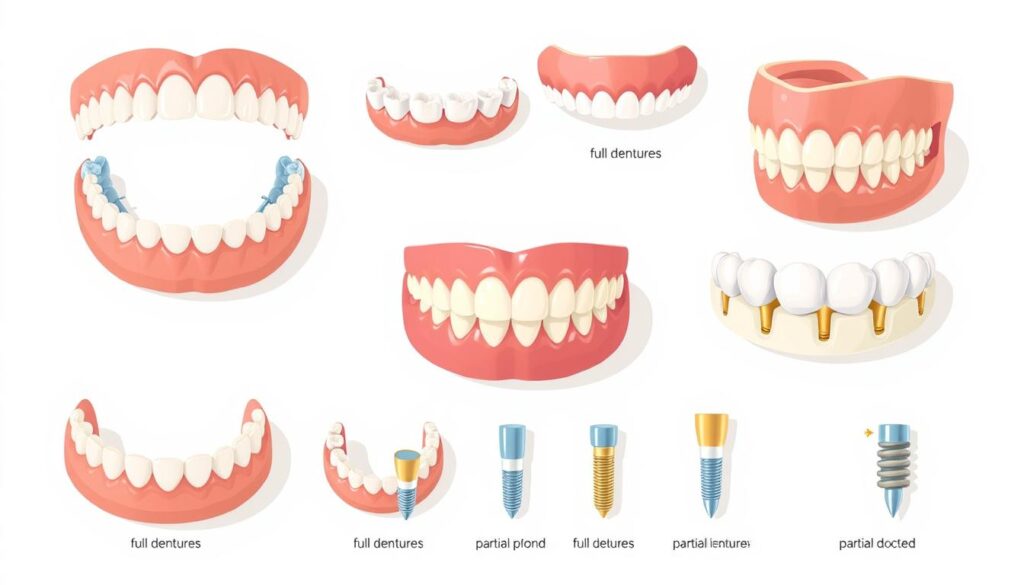
Dental implants are a modern way to replace missing teeth. They have three main parts: a titanium post, an abutment, and a crown. The titanium post is put into the jawbone, acting as a tooth root.
After the bone grows around the post, an abutment is attached. This connects the post to the crown, which is the part you see.
Getting dental implants involves several steps. First, a dentist checks if you're a good candidate. They use X-rays to see if your bone is strong enough.
Then, the titanium post is placed. You'll need to wait a few weeks or months for it to settle. This lets the implant get stable before adding the crown.
One big plus of dental implants is how long they last. They don't need to be replaced like dentures do. They can last for years, even a lifetime, with good care.
They also make your smile look better because they act like real teeth. Plus, they help keep your jawbone strong, which is good for your face.
Even with their benefits, dental implants have some downsides. You need enough bone to support them. If you don't, you might need a bone graft first.
They can also be more expensive than dentures. And, like any surgery, there's a risk of complications, like infection or nerve damage. That's why it's crucial to choose a skilled dentist.

Choosing between dentures and dental implants is a big decision. You need to think about cost, how long they last, and how they look. Each option has its own benefits and drawbacks that affect your oral health and happiness.
Dentures cost between $300 and $5000, depending on what you need. Dental implants start at $1,500 and can go up to $6,000 per implant. It's important to consider the upfront cost and any future expenses for replacements or adjustments.
| Type | Cost of Dentures | Cost of Dental Implants |
|---|---|---|
| Full Dentures | $1,000 - $5,000 | N/A |
| Partial Dentures | $300 - $2,000 | N/A |
| Implant Surgery | N/A | $1,500 - $6,000 each |
Dentures usually last 5 to 10 years and may need to be replaced. They need regular cleaning and sometimes adjustments. Implants, on the other hand, can last over 15 years with good care. They require dental hygiene and dentist visits.
How dentures and implants look is very important. Dentures might not feel as secure and can affect your confidence. Implants, however, look and feel like your own teeth, boosting your self-esteem and smile.
Choosing between dentures and implants is a big decision. It affects your oral health a lot. Dentures are easy to get and don't cost much, but they might need to be changed or adjusted often.
Dental implants are more expensive but last longer. They look and feel like real teeth. This can make you feel more confident about your smile.
When looking for the best dental solution in Turkey, talk to dental experts. They can help you choose based on your needs and lifestyle. Knowing about both dentures and implants will help you make the best choice for your teeth.
The decision between dentures and implants depends on what you value most. It could be comfort, looks, or cost. Make sure to find a good dental clinic in Turkey for the best results for your smile.
There are three main types of dentures. Complete dentures are for those who have lost all their teeth. Partial dentures are for people with some teeth left. Immediate dentures are put in right after a tooth is pulled, for looks.
Dental implants are great because they look and feel like real teeth. They also help keep your jawbone strong and your face looking good. Plus, they make eating and talking easier.
Dentures are cheaper to start with. But implants might save money in the long run because they last longer. The total cost depends on your specific needs and treatment plan.
Getting dental implants can be tough. You need enough bone, and it costs more upfront. Some people might feel pain or need extra steps to get ready for the implants.
Dentures can make eating easier, but they might not always feel right. Some people feel they don't fit well, especially when eating. Getting them adjusted can help a lot.
Dentures usually last 5 to 10 years with good care. Implants can last 15 years or more. But, you need to see your dentist regularly to keep them in good shape.
Yes, you can switch to implants if your health allows it. Talk to a dentist to see if you're a good candidate. They'll check your bone and overall health.
Think about cost, upkeep, comfort, and how they look and work. It's smart to talk to a dentist to figure out what's best for you.
Aesthetic dentistry has become very popular, especially in Turkey. It's not just about keeping teeth healthy. It's about making them look good too.
Thanks to new ideas and better dental care, people want their teeth to look natural. Social media and famous people have made this trend even bigger. The American Academy of Cosmetic Dentistry says it's helping people feel more confident and happy.
Aesthetic dentistry is always getting better with new techniques. These methods make teeth look better and make patients feel more comfortable. Technology helps dentists plan treatments carefully, making sure they are precise and effective.
Today's dentistry focuses on small, gentle treatments. Procedures like composite bonding and micro-abrasion make teeth look great without harming them. These methods mean patients can recover quickly and feel less pain, which is a big plus.
Digital Smile Design is a big change in how dentists plan treatments. It uses 3D images and special software to show what a smile could look like. This helps patients understand and agree with the plan, making them happier with the results.
Teeth whitening has gotten a lot better. Now, there are custom trays and laser treatments that whiten teeth fast and safely. These new ways to whiten teeth make it easier for people to get a brighter smile.

The world of aesthetic dentistry is changing fast, especially in Turkey. New things like porcelain veneers are becoming more popular. They help people get the smile they want without a big change.
More people want to look their best, showing off their unique style. 3D printing in dentistry is also changing how dentists work. It makes making dental plans and restorations easier and more precise.
Porcelain veneers are loved because they make smiles better without hurting the teeth. They cover up things like stains, chips, or crooked teeth. They last a long time, which is why many people choose them.
Young adults especially like them because they want their dental work to look good and last. It's all about getting a smile that looks great for a long time.
3D printing in dentistry is a big step forward. It lets dentists make custom dental pieces fast and accurately. This means patients don't have to wait as long for their dental work.
It also helps dentists plan treatments better. 3D printing is getting more popular because it's affordable and works well. It's making dental care better for everyone.

| Aspect | Porcelain Veneers | 3D Printing in Dentistry |
|---|---|---|
| Application | Cosmetic dental enhancements | Custom-fit restorations |
| Benefits | Dental aesthetics improvement, durability | Precision, speed, cost-effectiveness |
| Target Audience | Individuals seeking smile transformation | Dental professionals and patients |
| Longevity | Long-term results | Variable, depending on application |
The world of aesthetic dentistry is changing fast, especially in Turkey. New methods and tools are coming out to make patients happier. This article talked about the latest trends, like less invasive procedures and digital smile design.
These advancements aim to give patients results that look natural. They also try to make the process less painful. This shows a big change towards better treatment choices.
The future of aesthetic dentistry looks even more exciting. Dentists are working hard to meet patients' high expectations. As the field keeps up with new trends, dentists need to stay updated.
This helps both dentists and patients. It makes getting a beautiful smile easier and more rewarding.
In Turkey, the growth of aesthetic dental services shows how important looks and health are becoming. By always innovating and using new tech, aesthetic dentistry will keep getting better. This means every patient will get top-notch care and results that fit their needs.
Aesthetic dentistry makes teeth, gums, and smiles look better. It's more popular now because people care more about how they look. Advances in dental tech, especially in Turkey, have helped a lot.
New methods include less invasive procedures like composite bonding. Digital Smile Design uses 3D images for planning. Teeth whitening has also improved, offering safer and better results.
Porcelain veneers are popular because they make teeth look great without harming them much. They're perfect for those wanting a lasting fix for dental flaws.
3D printing is changing dental looks by making custom restorations fast. It means better fits, better results, and less time and money spent.
Social media shapes what we think is beautiful, making more people want dental makeovers. It shows how looks are important and encourages people to get treatments to fit in.
New teeth whitening methods include custom trays for home use and in-office laser treatments. These options are safer and more effective for a brighter smile.
Advances in dentistry, like less invasive procedures and digital planning, make patients happier. They get natural-looking results with less pain and quicker recovery times.
Bleeding gums are more than just a minor issue. They often signal deeper problems that can harm your oral health. It's crucial to treat bleeding gums to keep your teeth and gums healthy. This can prevent gum disease and other serious issues.
By acting quickly when you see signs of bleeding gums, you can improve your dental care. There are many ways to treat bleeding gums and find quick relief. Taking care of your gums is key to a healthy smile.
Bleeding gums can be a sign of health problems that need attention. Knowing why gums bleed helps us take better care of our gums and overall health.
One main reason for bleeding gums is plaque buildup from poor oral hygiene. If plaque isn't cleaned off, it causes inflammation. This can lead to gingivitis, a condition that can get worse if not treated.
Other causes include:
Gum disease is a big factor in bleeding gums. Bacteria in plaque cause inflammation, damaging gum tissue. This makes gums swell and bleed when you brush.
Knowing how gum disease and bleeding are linked helps us see the risk of infection. It also shows why regular dental visits are crucial.
Other things can also make gums bleed, like vitamin deficiencies and hormonal changes. Not enough vitamin C can weaken gum tissue. Hormonal shifts, especially in pregnant women, can make gums bleed more.
Medical conditions like diabetes can also cause gum problems that lead to bleeding.
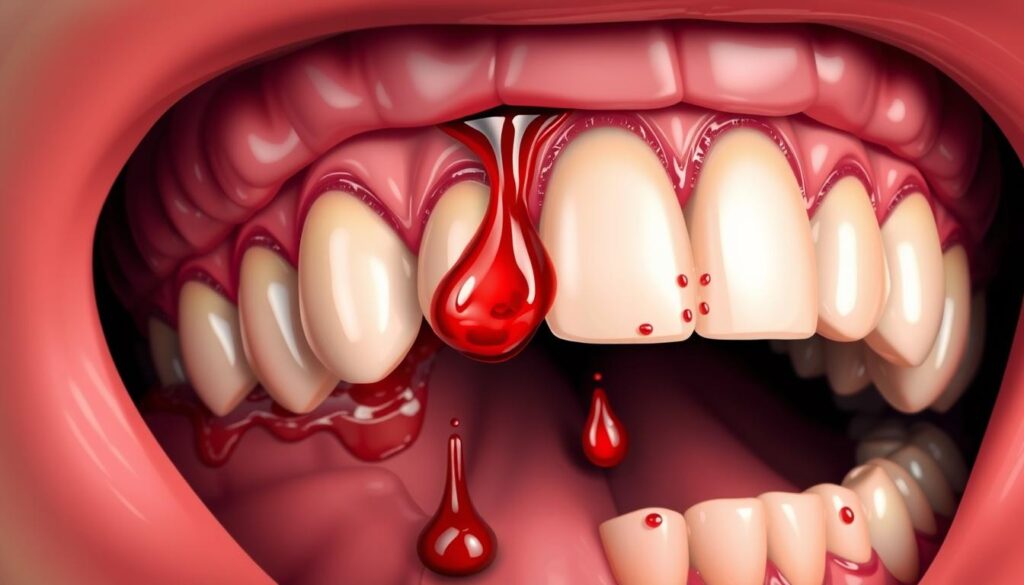
Bleeding gums can be scary and mean there's a problem with your gums. It's key to take action right away and prevent it from happening again. There are many ways to help your gums feel better and stay healthy.
Looking for fast fixes? There are home remedies for bleeding gums that can help. Here are a few:
When home remedies aren't enough, you need to see a dentist. They might suggest:
Good oral hygiene is key to avoiding gum disease. Here's how to keep your gums healthy:

Using home remedies, dental treatments, and good oral hygiene can help manage bleeding gums. This way, you can prevent them from happening again.
Addressing bleeding gums is key. Knowing the causes like gum disease and poor oral hygiene is crucial. Getting dental advice is important for finding the right treatment.
Keeping gums healthy is more than just treating symptoms. It's about being proactive with dental care. Daily habits and regular dental visits can help a lot. Healthy gums are important for your overall health.
Don't ignore bleeding gums. Taking care of your gums is essential. By following the tips in this article, you can keep your gums healthy. This will help your smile stay bright and healthy.
Poor oral hygiene often leads to bleeding gums. This is due to plaque buildup and gum diseases like gingivitis and periodontitis. Vitamin deficiencies, hormonal changes, and certain medical conditions can also cause it.
To treat bleeding gums at home, try rinsing with warm saltwater. You can also use a cold compress and natural antiseptics like tea tree oil. These methods can help reduce inflammation and provide quick relief.
If home remedies don't work or if bleeding continues, see a dentist. They can perform scaling and root planing to remove plaque and tartar. Regular check-ups are also key to monitoring gum health.
To prevent bleeding gums, brush your teeth twice a day and floss daily. Use an antibacterial mouthwash too. Regular dental check-ups help catch gum disease early and prevent it.
Yes, bleeding gums can be a sign of gum disease or other health problems like diabetes or vitamin deficiencies. It's crucial to address gum bleeding quickly to avoid more serious issues.
Nutrition greatly affects gum health. Lack of essential vitamins, especially Vitamin C, can cause gum problems. Eating a balanced diet with fruits, vegetables, and whole grains supports oral health and prevents bleeding gums.
Impacted tooth pain can really hurt and make everyday life tough. It happens when a tooth can't come out because there's no room. This can cause pain, swelling, and even infections.
Knowing what causes and shows impacted tooth pain is key to feeling better. We'll look at why it happens and how to ease the pain. We'll cover home remedies and what your dentist can do to help. Being informed helps you take care of your teeth and feel better.
Impacted tooth pain comes from many dental issues. Knowing what causes it is key to managing it. Teeth get impacted when they can't come out right, causing pain and problems.
There are several reasons for impacted tooth pain. Some common ones are:
Impacted teeth can cause swelling and pain. In bad cases, they might get infected, making things worse.
The signs of tooth pain from impaction vary. Spotting these signs early is important. Common symptoms are:
There are many ways to deal with impacted tooth pain. You can try natural remedies or use over-the-counter solutions. Finding the right method can help you feel better and manage your pain.
Many people use home remedies to ease tooth pain. Here are some common ones:
For quick relief, you can try over-the-counter pain medications. Options like ibuprofen or acetaminophen can help. Always follow the dosage instructions to use them safely.
Knowing when to see a dentist is important. Look out for these signs:
Getting help quickly can prevent bigger problems and ensure you get the right treatment.

People with impacted teeth look for effective solutions. Dental procedures help with pain, prevent problems, and improve oral health. Knowing your options helps you choose the best dental care.
Extraction is a common treatment for impacted teeth. It's needed when the tooth harms nearby teeth or could get infected. Sometimes, surgery is needed to move the tooth into place.
After surgery, an orthodontist checks the teeth alignment. This ensures the treatment works well in the long run.
Orthodontic treatments are key for lasting solutions. They align teeth to avoid future problems. Working with a dentist helps create a treatment plan just for you.
This approach tackles immediate issues and promotes dental health. It's a comprehensive way to care for your teeth.

Recognizing the signs of impacted teeth early is key to avoiding pain and serious dental issues. Ignoring these signs can lead to infections and harm to other teeth. This article has shown various ways to manage pain, from home remedies to over-the-counter drugs.
It's important to keep your dental health in check. Whether you use simple remedies or see a dentist, acting fast is crucial. Early action not only relieves pain but also prevents bigger dental problems. A healthy smile is vital for your overall health, so don't overlook your dental care.
Impacted tooth pain happens when a tooth, like a wisdom tooth, can't come out because of no space. This causes a lot of pain, swelling, and can get infected.
You might feel a throbbing pain in your jaw and swelling. It's hard to open your mouth. If it's infected, you might also have a fever.
Teeth can get impacted because of crowded teeth, bad tooth growth, or not enough jaw space. This traps teeth under the gums.
Try warm saltwater rinses and cold compresses to numb the pain. Clove oil or peppermint tea can also help because they're soothing.
Yes, you can use ibuprofen or acetaminophen to help with the pain. Just remember to take the right amount as the package says.
See a dentist if the pain doesn't go away, if your jaw is really swollen, or if you have a fever. These signs mean you might need urgent care.
Dentists might remove the tooth, try to get it to come out, or use orthodontics to fix the problem. This helps avoid future problems.
For lasting solutions, orthodontics can help align teeth. A dentist will create a plan just for you to keep your teeth healthy for years.
Tooth extraction is a common dental procedure. It's important to know how to care for yourself after it. Following the right tips can help you recover well and avoid problems.
After a tooth extraction, rest is key. Your dentist will give you specific advice to follow. Knowing about possible complications can also help you recover better.
This guide is based on advice from the American Dental Association and dental health experts. It's a valuable resource for anyone going through the aftercare of a tooth extraction.
When you need a tooth pulled, it's good to know why and how it's done. Many people worry about tooth extraction. But learning about tooth extraction reasons can help calm your nerves. Knowing why you need dental surgery can make things clearer.
Tooth extraction is needed for a few reasons, including:
Knowing about the tooth extraction procedure can help you feel better. Here's what happens:
Tooth extraction is a common way to keep your mouth healthy. Knowing about dental extraction can make you feel more ready for it.
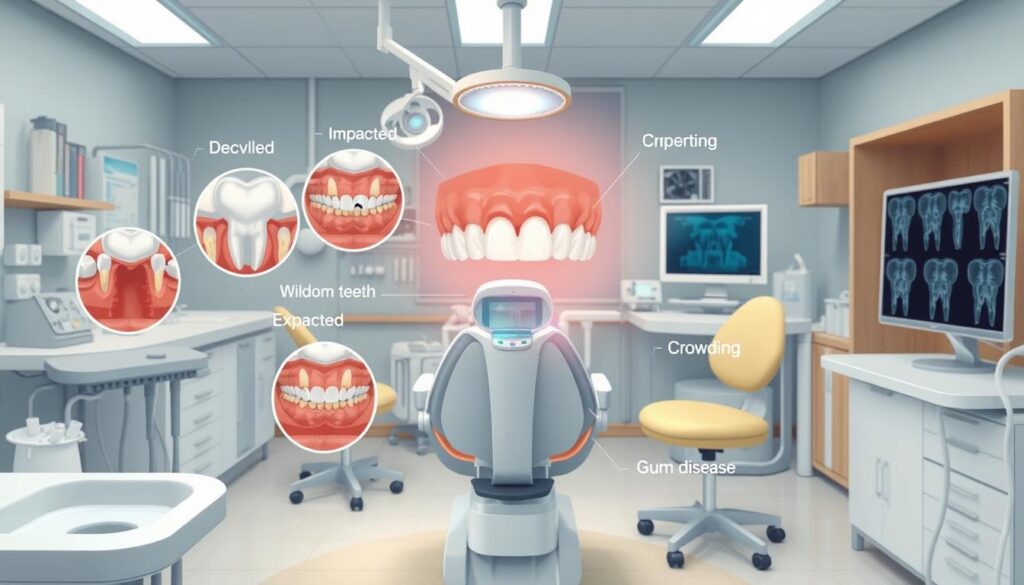
After a tooth extraction, it's key to follow certain care steps for a smooth recovery. Proper care helps reduce pain and aids in healing. Knowing the initial steps can greatly improve your recovery.
Right after the extraction, take these steps to help heal:
Managing pain after dental surgery is a big concern for many. There are several ways to manage pain:
Keep an eye on your pain levels. If pain gets worse or doesn't go away, see your dentist for help.
It's important to watch for signs of trouble after a tooth extraction. Knowing the signs of infection and bleeding can help your recovery. Here are some key signs to look out for and what to do if you see them.
Infections can happen after a tooth extraction. They show up in different ways. Keep an eye out for:
If you notice these signs, see a dentist right away. They can help prevent bigger problems.
Some bleeding after extraction is normal. But if it keeps going, it might be a sign of a bigger issue. Watch for how much bleeding is normal. If it lasts more than 24 hours, you might need to take steps to stop it:
If bleeding doesn't stop, you need to see a dentist fast. They can help you recover safely.
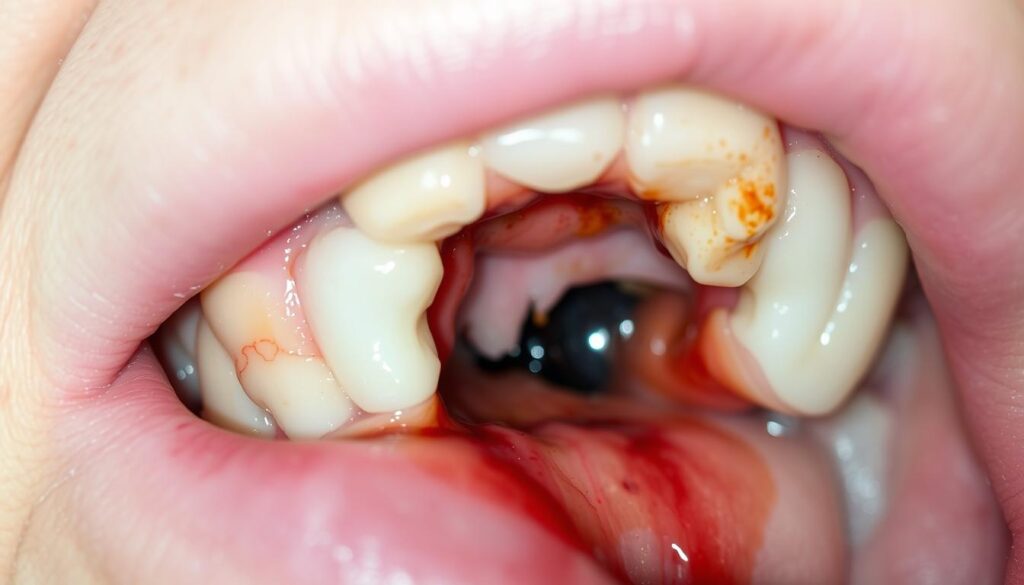
Tooth extraction recovery is all about following dental aftercare tips from healthcare pros. It's crucial to stick to these guidelines closely. They play a big role in how well you heal.
Managing pain is also important. Using the right pain relief can make you feel better while you recover. This makes the healing process easier.
Spotting complications early is key to a smooth recovery. Keep an eye out for signs of infection or bleeding that won't stop. Research and patient stories show that being proactive and careful is essential.
By understanding the importance of tooth extraction recovery, you can see dental procedures in a new light. Committing to a thorough recovery plan can make you feel more confident and calm.
First, keep gauze on the extraction site for the time your dentist recommends. This helps control bleeding. Avoid rinsing or spitting and don't do strenuous activities for 24 hours. These steps help your teeth heal well.
To manage pain, use the pain meds your dentist prescribed or bought over-the-counter. Cold compresses on the area can also help. Eating soft foods also reduces discomfort. If pain doesn't go away, talk to your dentist.
Watch for swelling, fever, and pain that gets worse. These are signs of infection. If you see these, get to your dentist right away.
Bleeding usually stops in a few hours after the extraction. But if it keeps going or is a lot, use gauze and call your dentist. They can help with bleeding.
No, it's best to eat soft foods for a while. Avoid hot, spicy, or crunchy foods that might hurt the site. As it heals, you can start eating regular foods again.
Watch out for dry socket, where the blood clot gets dislodged. This causes pain and slows healing. Catching these problems early helps your recovery.
Post-extraction care is key for a smooth recovery. It helps avoid problems and speeds up healing. Following your dentist's instructions is very important.
If you have severe pain, bleeding that won't stop, fever, or any other concerns, call your dentist. Quick action can prevent bigger problems.
In the world of cosmetic dentistry, getting the perfect smile often involves dental veneers. Zirconia and porcelain veneers are two top choices. They help make teeth look better, fix flaws, and give a great smile. Knowing the differences between zirconia and porcelain veneers is key for those thinking about cosmetic dentistry.
Each material has its own good points and bad points. These affect how long they last, how they look, and the cost. This article will dive into these differences. It aims to help people make smart choices for their smile.
Zirconia veneers are becoming more popular in cosmetic dentistry. They are made from zirconium dioxide. This material is strong and looks good, making them perfect for many dental needs.
Zirconia veneers are thin, custom-made shells for your teeth. They are made of dental zirconia. This makes them strong against chipping and cracking.
They look like real teeth because of their translucency. This makes them a great choice for improving your smile.
Zirconia veneers have many benefits:
Who is a good fit for zirconia veneers?

Knowing the differences between zirconia and porcelain veneers helps patients make better choices for their teeth. Each veneer has its own strengths in durability, looks, and price. Here's a detailed look at these two options.
Zirconia veneers are known for their veneer durability. They are very strong and less likely to break, which is great for people with strong bites or dental problems. Porcelain veneers are also durable but not as strong against chipping and cracking. This makes zirconia better for those who grind their teeth.
Looking at veneer aesthetics, porcelain veneers are often the top choice. They look very natural and have a beautiful, translucent finish. Zirconia veneers are strong but don't match porcelain's natural look as well, affecting their appearance.
When it comes to veneer cost, there's a big difference. Zirconia veneers are more expensive because of the advanced technology and materials used. Porcelain veneers might be cheaper upfront, but zirconia's longer life could save money in the long run. Patients should think about both the initial cost and long-term savings when deciding.

Knowing the difference between zirconia and porcelain veneers is crucial for those looking into dental aesthetics. Zirconia veneers are known for their durability and strength, perfect for those who want long-lasting results. Porcelain veneers, on the other hand, offer a natural look and feel, ideal for those seeking a flawless smile.
Your choice should match your needs, like your desired look, budget, and lifestyle. Both types can greatly improve your smile and boost your confidence. It's important to talk to a dentist to find the best option for you.
Choosing between zirconia and porcelain veneers requires understanding their unique qualities. Think about your dental health and the benefits each offers. This way, you can make a choice that will satisfy your cosmetic goals.
Zirconia veneers are stronger and last longer, making them great for people with dental problems. Porcelain veneers look more natural and are very clear. They are more about looks than strength.
Zirconia veneers can last 10 to 15 years. This is because they are very durable. They are a good choice for those who grind their teeth.
Zirconia veneers work well for many people. They are best for those with worn-down teeth or bruxism. It's best to talk to a dentist to see if they're right for you.
Zirconia veneers cost more upfront because of the technology used. But, they last longer. This can make them cheaper in the long run than porcelain veneers.
No, zirconia veneers don't need special care. Just brush, floss, and go to the dentist regularly. They are very durable and can last a long time with good care.
Yes, zirconia veneers can make discolored teeth look much better. They cover stains and give a brighter smile. Talking to a cosmetic dentist can help get the best results.
While zirconia veneers have many benefits, there are some downsides. They cost more at first, need some tooth work, and might not look as natural as porcelain veneers in some lights.
Knowing how long orthodontic treatments last is key for those thinking about getting one. The time needed can range from a few months to a couple of years. Each person's case is different, with many things affecting how long treatment takes.
Things like how complex the dental work is, the patient's age, and the type of braces used are important. The American Association of Orthodontists offers insights into these differences.
Orthodontic treatments fix misaligned teeth and jaws. They make teeth work better and look better. These treatments solve problems like crowded teeth and bad bites. They are key to better oral health and overall health.
Orthodontic treatments use special methods to align teeth and jaws. They make smiles look good and improve oral health. Bad teeth alignment can cause chewing problems and wear down teeth.
Orthodontics uses different tools to fix these issues. This helps teeth and jaws work right together.
There are many types of orthodontic care. Knowing about them helps you choose the right one. Here are some common ones:
| Appliance Type | Visibility | Materials Used | Common Use Cases |
|---|---|---|---|
| Traditional Metal Braces | Visible | Metal | Severe alignment issues |
| Ceramic Braces | Less visible | Ceramic | Moderate to severe cases |
| Lingual Braces | Invisible | Metal | Individuals seeking discretion |
| Clear Aligners | Invisible | Plastic | Mild to moderate alignment issues |

The time it takes for orthodontic treatments can change a lot. It's important to know what affects it. Key things include the patient's age, how bad the dental problems are, the type of treatment, and how well the patient follows the treatment plan. Each of these factors plays a big role in how long treatment will last.
The age of the patient is a big factor in how long treatment takes. Younger patients often get treatment faster because their jaws are still growing. This makes it easier to move teeth into place.
Adults, on the other hand, might need treatment for longer. This is because their bones and jaws are more set, making it harder to adjust them.
The severity of dental problems also affects treatment time. For example, if teeth are very crowded or not aligned right, treatment takes longer. Simple cases might only need a few months, but more complex ones can take years.
There are different types of orthodontic treatments, and each has its own time frame. Traditional braces take longer because they apply constant pressure to move teeth. Clear aligners, on the other hand, might be faster for some because of their design.
How well a patient follows the treatment plan is very important. Not following instructions can cause delays and make treatment longer. Patients who stick to the plan tend to have shorter treatment times.

| Factor | Impact on Duration |
|---|---|
| Age of the Patient | Younger patients tend to have shorter treatment times. |
| Severity of Dental Issues | More severe problems require extended treatment durations. |
| Type of Orthodontic Treatment | Traditional braces usually take longer than clear aligners. |
| Patient Compliance | Higher compliance leads to shorter treatment timelines. |
The time needed for orthodontic treatments varies a lot. It depends on many factors. Knowing these details is key for those thinking about getting orthodontic work.
Age, how bad the dental problems are, the type of appliance, and how well you follow instructions matter a lot. This shows why getting care that fits you is so important. You should talk to experienced orthodontists to get a good plan.
Being patient and committed is crucial for good results. Orthodontics do more than just straighten teeth. They also improve your health, how well you can eat, and how you feel about yourself.
People thinking about orthodontics should see a qualified doctor. They can give you a plan that fits your needs. This way, you're more likely to be happy with your treatment.
Many things can change how long orthodontic treatments last. The complexity of dental work, the patient's age, and the type of braces used are key. Younger patients often have shorter treatments because their jaws are still growing. Adults might need more time.
Orthodontic treatments can last anywhere from a few months to a few years. Most treatments fall between one to three years. This depends on how severe the dental issues are.
There are several types of orthodontic appliances. These include metal braces, ceramic braces, lingual braces, and clear aligners like Invisalign. Each type is suited for different dental needs and offers unique benefits.
Following orthodontic instructions is very important. It helps treatments go smoothly and quickly. Regular visits and good oral hygiene are key to a successful treatment.
Knowing how long orthodontic treatments take helps set realistic goals. It shows that sticking to the treatment plan is crucial for success. It's all about commitment and patience.
Yes, adults often face longer treatment times. This is because their jaws are fully grown and dental issues can be more complex. More adjustments are needed.
Different treatments have different timelines. Metal braces usually take longer than clear aligners like Invisalign. Clear aligners are often quicker and more convenient for some cases.
During treatment, you'll see your orthodontist regularly. They'll check your progress, make adjustments, and talk about any issues. This ongoing care is vital for the best results.
Knowing the cost of root canal treatment is key for patients, especially those looking for affordable dental care in Turkey. This procedure is vital for saving teeth that are infected or decayed. Several factors affect the cost, like the complexity of the procedure, the dental clinic, and where you are.
Also, your dental needs and the materials used can change the total cost. Studies show big price differences in different countries. So, it's important to do your homework before deciding.
Root canal treatment is key in endodontics, aimed at fixing problems with infected tooth pulp. Knowing about this treatment and its benefits is crucial for good dental health.
A root canal removes infected tissue from a tooth. It's important to stop decay and save the tooth from being pulled. Dentists or endodontists use special tools to clean and shape the canal. Then, they fill it with materials that are safe for the body to keep the tooth strong.
Several symptoms of infection show when a root canal is needed. Look out for:
These signs mean the pulp in the tooth is damaged. This calls for treatment to keep your mouth healthy.
Choosing a root canal has many advantages of root canal treatment. These include:
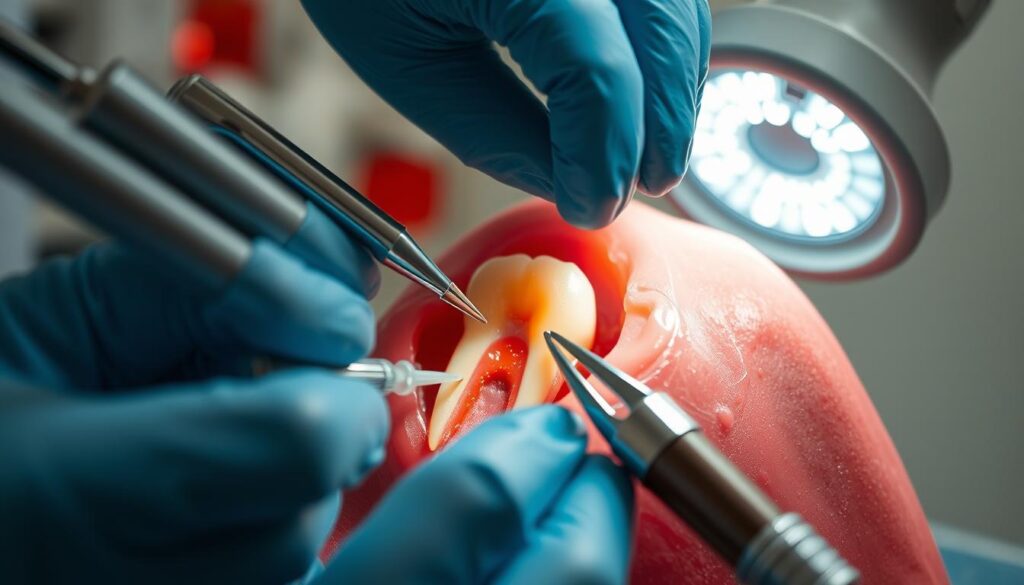
It's important to know the cost of root canal treatment before you decide. In Turkey, the price varies a lot. This helps patients make smart choices about their teeth.
In Turkey, root canal treatment costs between $100 and $400. The price changes based on the tooth's location and how complex the case is. Many find Turkey's prices much lower than in Western countries.
People often compare local dental prices to international ones, especially for dental tourism. In the U.S., root canals can cost thousands. Turkey, however, offers quality care at a lower price. Turkish clinics use the latest technology and skilled staff, all without breaking the bank.

Understanding root canal treatment is key for those with dental problems. It not only relieves pain but also saves natural teeth. This makes it a great choice for keeping your mouth healthy.
Turkey is a top spot for dental care, known for its quality and low prices. It focuses on educating patients about treatments and costs. This way, people can choose wisely.
Looking into treatment benefits and costs helps patients make smart choices. This approach improves dental health and keeps costs down. Getting dental care in Turkey can lead to long-term benefits and a healthier smile.
Root canal treatment costs include exams, the procedure, X-rays, and filling materials. Extra treatments like crowns or follow-ups may add to the cost.
Yes, many clinics offer financing plans for root canals. You can look into payment plans, insurance, or third-party financing to make it more affordable.
Dentists check for symptoms like severe toothache, swelling, or discoloration. They use X-rays and pulp tests to see if the tooth needs a root canal.
Yes, there's a difference. Endodontists specialize in root canals and have more training. General dentists can do root canals too, but endodontists are better for complex cases.
Root canal treatment relieves pain, prevents tooth loss, and keeps your teeth working. Keeping your natural teeth improves your dental health and quality of life.
Dental tourism can make root canal treatment cheaper. Many go to places like Turkey for lower prices without losing quality.
Look at the clinic's reputation, the dentist's qualifications, and the technology used. Also, check patient reviews and costs. Find a clinic that offers quality care at a good price.
Keeping your teeth clean is key to good oral health. Regular dentist visits are important. They make sure your smile stays bright and catch problems early.
This series of steps is crucial. It helps prevent cavities, gum disease, and more. Knowing how to keep your teeth clean is vital for your health. We'll go over the steps of the teeth cleaning procedure in the next sections.
Keeping your mouth healthy means knowing how important teeth cleaning is. Regular dental visits help avoid many health problems. Not taking care of your teeth can cause serious issues, showing why you should always keep your mouth clean.
Dental cleanings remove plaque and tartar, which cause gum disease and tooth decay. Experts say you should get your teeth cleaned every six months. This keeps your mouth healthy and can even help your overall health.
Poor dental care can lead to heart disease and diabetes. Knowing this makes it clear why keeping your teeth clean is so important.
Not cleaning your teeth regularly can have serious effects. It can cause:
Bad dental hygiene can also cost a lot of money. People who don't go to the dentist often end up spending a lot on dental care. Knowing this might make you want to go to the dentist more often.

| Neglecting Dental Hygiene Consequences | Potential Impact |
|---|---|
| Cavities Development | Increased treatment costs and discomfort |
| Severe Gum Disease | Possible tooth loss and surgery |
| Bad Breath | Social embarrassment and avoidance |
| Systemic Health Issues | Higher healthcare costs and complications |
The teeth cleaning process is key to keeping your mouth healthy. It starts with a dental exam by your dentist. This exam helps your dentist tailor care just for you.
During the initial check-up, your dentist looks for plaque, cavities, or gum issues. This step is crucial for finding the best ways to care for your teeth.
The dentist inspects your mouth during the exam. They focus on areas needing extra attention. This helps create a cleaning plan just for you.
By addressing these areas early, you get healthier gums and a brighter smile.
Scaling is the next step, where tools remove plaque. This process gets rid of harmful tartar on and under your gums. It's key to avoiding dental problems and keeping your mouth healthy.
After scaling, the hygienist polishes your teeth. They use a soft cup and paste to remove stains and smooth your teeth. This leaves your smile brighter and your teeth protected.
The last step is the fluoride treatment. It strengthens your enamel and protects your teeth. This is especially important for those at risk of cavities.
Fluoride is applied as gel, foam, or varnish. It helps keep your teeth healthy for a long time.
You should get a professional teeth cleaning every six months. This helps keep your mouth healthy and prevents tartar buildup. Tartar can cause gum disease and cavities.
At a teeth cleaning appointment, the dentist first checks your teeth. Then, they scale to remove plaque and tartar. After that, they polish your teeth to make them shine. Finally, they apply a fluoride treatment to protect against cavities.
Most people don't feel much pain during teeth cleaning. Dentists use special tools to clean your teeth gently but thoroughly. If you're worried about pain, talk to your dentist before your appointment.
Fluoride treatment is key because it strengthens your tooth enamel. It also helps protect your teeth from decay, especially if you're at risk for cavities.
Yes, not taking care of your teeth can harm your overall health. It can lead to serious conditions like heart disease and diabetes. Regular dental cleanings are important to avoid these risks.
To keep your teeth clean at home, brush twice a day and floss every day. Use mouthwash as directed. Also, eat a balanced diet and avoid too much sugar to help your teeth stay healthy.
Porcelain veneers are changing the game in cosmetic dentistry. They offer a top-notch way to improve smiles. These thin, custom-made shells cover the front of teeth, making them a great choice for those looking to enhance their smile.
One of the best things about porcelain veneers is how well they look like real teeth. They also boost self-confidence. As more people learn about them, especially in places like Turkey, they see how much of a difference they can make.
Porcelain veneers are loved for their natural look. They blend well with your teeth, making your smile look better over time.
Natural-looking veneers look just like your real teeth. They reflect light like enamel, giving a natural shine. Dentists use special techniques to match the color and shape of your teeth.
This makes your new smile look real. It's hard for people to tell you've had work done.
Custom porcelain veneers come in many shades. This lets you choose how bright you want your smile to be. It's great for those who want a subtle or bold change.
Working with your dentist, you can pick the perfect shade. This way, your smile can truly reflect who you are.
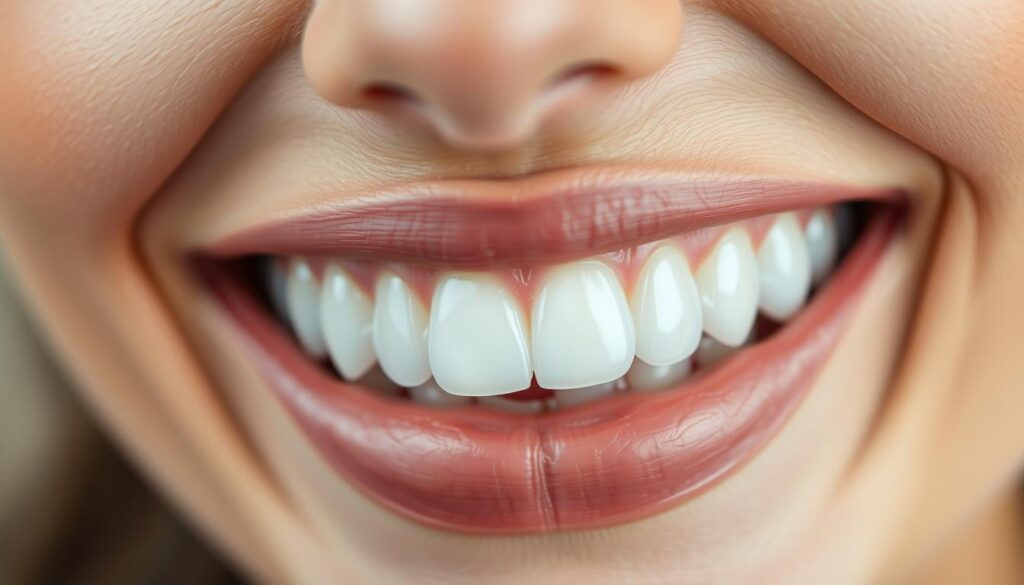
| Feature | Benefits |
|---|---|
| Natural Appearance | Mimics enamel properties for a realistic look |
| Shade Matching | Personalized color selection for each individual |
| Customization | Options to enhance brightness while maintaining natural aesthetics |
| Durability | Long-lasting, making them a practical choice for cosmetic enhancement |
Porcelain veneers are a top choice for dental solutions. They are strong and last long, making them great for cosmetic improvements. Knowing why they last so long helps people choose the best dental care.
Porcelain veneers are great because they don't stain or discolor easily. Unlike other materials, they don't soak up colors from food, drinks, or smoking. This means your smile stays bright without needing constant touch-ups.
More and more people want their dental work to last. Porcelain veneers are known for their beauty and lasting power.
Porcelain veneers last longer and look better than composite ones. Composite veneers might seem cheaper at first, but they don't last as long. Studies show they can chip and stain, losing their shine.
Porcelain veneers, however, can last over 10 years with good care. They offer a long-lasting smile for those who invest in their dental health.
| Feature | Porcelain Veneers | Composite Veneers |
|---|---|---|
| Stain Resistance | High | Moderate |
| Durability | Long-lasting (10+ years) | Shorter lifespan (5-7 years) |
| Maintenance | Low | Higher due to wear and tear |
| Cost | Higher initial investment | Lower initial cost |

Porcelain veneers do more than just make your teeth look good. They can make you feel more confident and boost your self-esteem. This can change your life for the better.
Having better-looking teeth can really impact your life. People with nice teeth often feel more at ease when they're out. This can help them feel better about themselves and enjoy life more.
Getting porcelain veneers is quick and doesn't hurt much. You only need two visits to the dentist. This makes it easy to fit into your busy schedule. Plus, it doesn't harm your natural teeth, making it a great choice for a long-lasting fix.
In summary, porcelain veneers offer many dental aesthetic benefits. They make your smile look natural and can be customized to fit your teeth perfectly. This makes them a great choice for anyone wanting to improve their look.
These veneers are not just about looks. They also last a long time and don't stain easily. This means they are a smart choice for keeping your smile beautiful for years to come.
Porcelain veneers can also boost your confidence. Many people feel more confident and positive about themselves after getting them. The process is quick and doesn't hurt much, making it a good option for those who want a brighter smile.
It's important to talk to a certified cosmetic dentist before getting veneers. They can help find the best option for you. In conclusion, getting porcelain veneers could be a big step towards the smile you've always wanted. It's all about making the right choice for your dental health and beauty.
Porcelain veneers are thin, custom-made shells for teeth. They cover the front of teeth to improve their look. They are a top choice in cosmetic dentistry for better smiles.
Dental veneers boost your smile and self-confidence. They also resist stains well. They are a durable way to get a beautiful smile.
Porcelain veneers match your natural teeth perfectly. Cosmetic dentists use advanced techniques for color and shape matching. This ensures they look natural.
Yes, porcelain veneers resist stains well. They are great for those who drink coffee or wine, or smoke.
With care, porcelain veneers can last over 10 years. They last longer than composite veneers, which can chip or stain.
Getting porcelain veneers takes two visits. The first visit prepares your teeth. The second visit places the veneers. It's a quick and simple process.
Yes, many people feel more confident after getting veneers. Their improved smile can change their personal and professional lives.
Porcelain veneers have some downsides. They are more expensive than other options. Also, some natural tooth enamel is removed during the procedure.